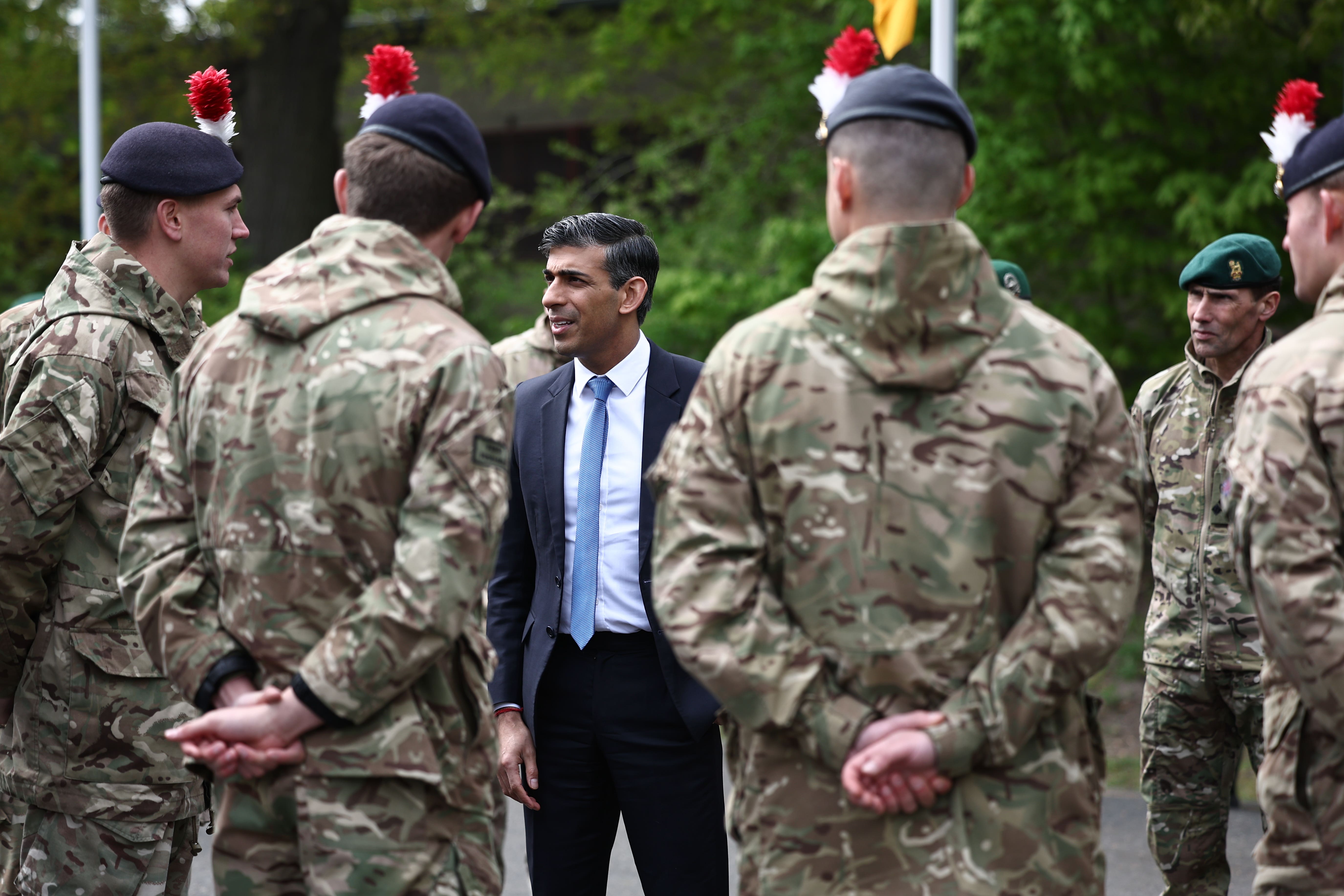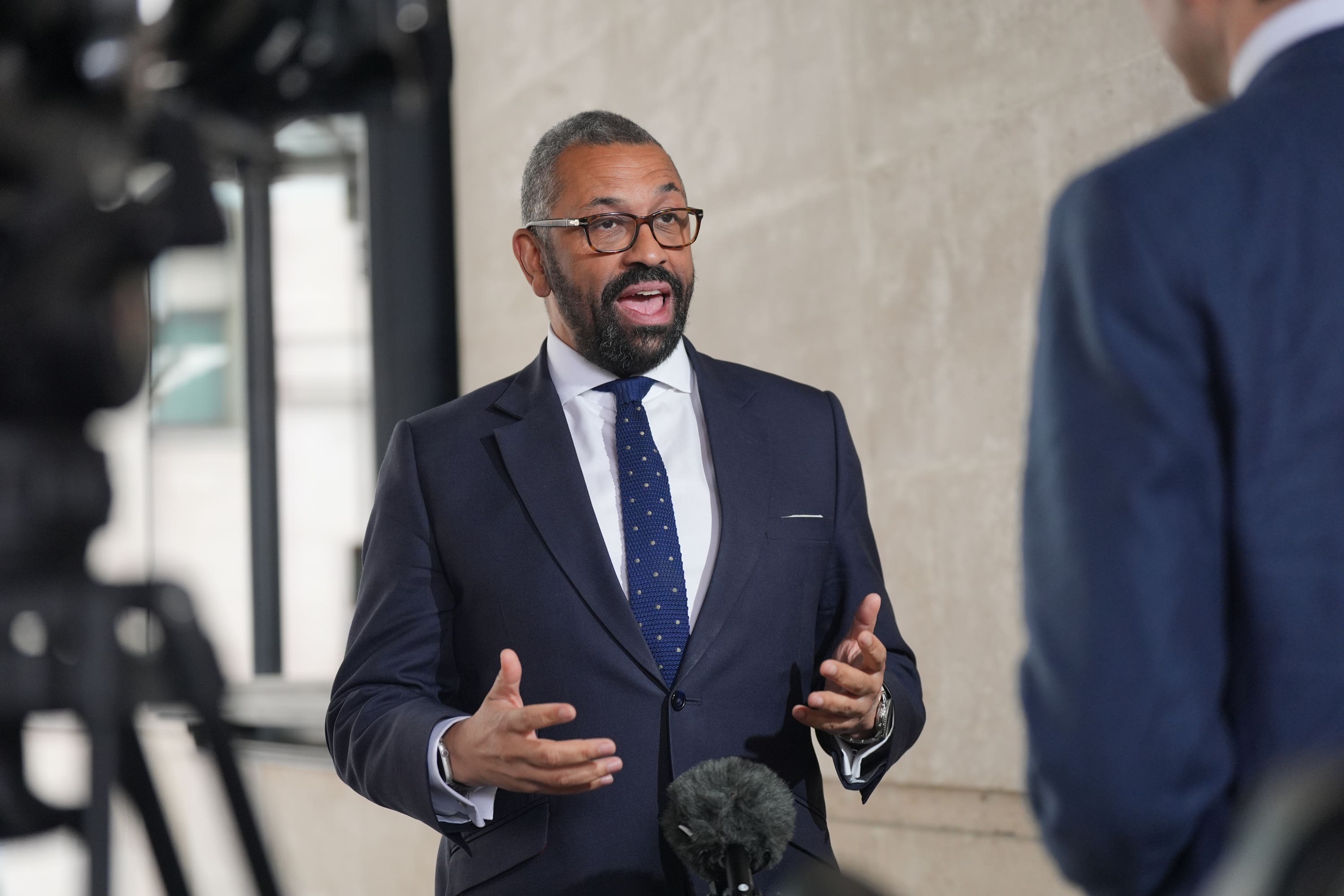Defence minister ruled out national service over morale fears day after Rishi Sunak called election
Rishi Sunak’s proposal to reintroduce national service 61 years after it was scrapped has created a backlash
A Tory defence minister warned on the first day of the general election campaign that Rishi Sunak’s plan to reintroduce national service would “damage morale” in the military.
Andrew Murrison signed off a written answer to fellow Tory MP Mark Pritchard which was published less than 24 hours after the prime minister had dramatically called a snap election.
The response from a seasoned minister has been highlighted after there was a furious backlash to the Tory plan revealed overnight to reintroduce national service for school leavers.
National service was scrapped in 1963 but now, if the Conservatives win power again, school leavers would be given the option of joining the military and getting paid or doing voluntary service for nothing.

In his response, Mr Murrison warned: “The demanding, increasingly technical nature of defence today is such that we require highly trained, professional men and women in our regular and reserve armed forces, fully committed to giving their best in defending our country and its allies.
“If potentially unwilling national service recruits were to be obliged to serve alongside the professional men and women of our armed forces, it could damage morale, recruitment and retention and would consume professional military and naval resources.
“If, on the other hand, national service recruits were kept in separate units, it would be difficult to find a proper and meaningful role for them, potentially harming motivation and discipline. For all these reasons, there are no current plans for the restoration of any form of national service.”
The public sector union Unison suggested the Conservatives were trying to find a way of filling job vacancies on the cheap as the government tries to stem the flow of immigration.
Unison general secretary Christina McAnea said: “Essential services need proper resourcing and enough decently paid staff to deliver for the public, not thousands of reluctant teen ‘volunteers’ who’d rather be anywhere else and would require supervision by an already overstretched workforce.”
There was also a row over how the scheme would be funded with anger that the Conservatives plan to raid cash for “levelling up” in the Shared Prosperity Fund to pay for their new national service plan.

This was after Mr Sunak's own North Yorkshire council received £16.9m from the fund and home secretary James Cleverly’s Braintree constituency got £1.6m from it despite neither seat being a red wall area of deprivation.
Lib Dem local government spokesperson Helen Morgan said: “The fact they are planning to slash local funding to pay for these ludicrous plans shows just how out of touch the Conservative Party has become.”
Historian Glen O’Hara, a professor of modern and contemporary history at Oxford Brookes University, said: “The Tories have abandoned levelling up tonight, abandoned coastal Britain, abandoned North Wales, abandoned Cornwall and all those areas they promised wouldn't lose out from Brexit. Are they out of their minds?”
Under the Conservatives' new proposal, young people would be given a choice between a full-time placement in the armed forces for 12 months or spending one weekend a month for a year "volunteering" in their community.
The prime minister said the policy would help unite society in an “increasingly uncertain world” and give young people a “shared sense of purpose”.
In an apparent pitch to older voters, Mr Sunak said volunteering could include helping local fire, police and NHS services as well as charities tackling loneliness and supporting elderly, isolated people.
Mr Cleverly confirmed that teenagers would not be jailed for refusing to take part in the proposed scheme.
He said the plans were aimed at getting young people “out of their bubble” and would not involve the threat of criminal sanctions for those who refuse to comply.
Labour criticised the scheme, with shadow work and pensions secretary Liz Kendall branding the announcement a “headline-grabbing gimmick”.
And former Ukip leader Nigel Farage described it as a “desperate attempt to win back voters from Reform”.
Analysis shows that training 10,000 national service volunteers in the army would require the creation of 432 battalions, based on 72 trainees per company and six battalions per company.
According the blogger, who is an ex-MoD civil servant and was praised by ex-defence secretary Ben Wallace, one estimate suggests that to staff training units would require 750 officers and 5,000 NCO’s to staff these units at a cost of around £311m a year alone.
Adding in further costs, the analysis concludes that it is “hard to see how this policy could be delivered for the stated cost of £2.5bn per year given that even rough calculations are showing that it would cost billions more to deliver both short and long term.”
There were also concerns that the scheme is another way of punishing a generation which already had to make terrible sacrifices during the Covid lockdowns.
Sam Bidwell, director of the Next Generation Centre at the right-wing Adam Smith Institute think tank, said: “Young Britons have already done their fair share of national service, sacrificing the best years of their lives to protect the elderly from Covid. That’s not to mention our broken economy.”
There is some nervousness that the scheme could be a genuine preparation for war and conscription, with fighting in Europe after Russia’s invasion of Ukraine and ongoing problems in the Middle East.
Last year the head of the British army, General Sir Patrick Sanders, said: “As the pre-war generation, we must similarly prepare. That is a whole-of-nation undertaking.”
He also referred to the need for an army “designed to expand rapidly… to train and equip the citizen army that must follow”.
Join our commenting forum
Join thought-provoking conversations, follow other Independent readers and see their replies
Comments
Bookmark popover
Removed from bookmarks